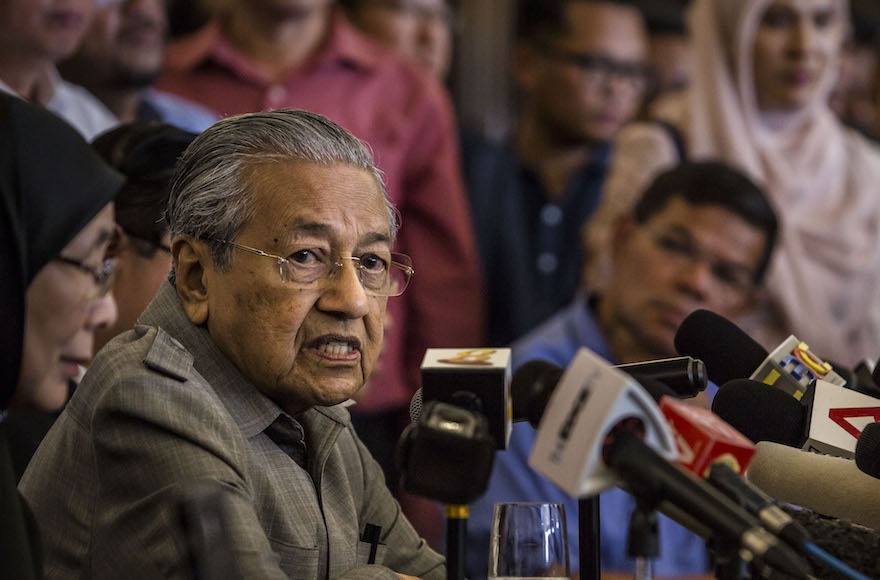IN THE MEDIA
On Australia’s Jerusalem Embassy review, don’t take advice from bigoted Mahathir
November 27, 2018 | Colin Rubenstein

An edited version of this article appeared in the West Australian on Nov. 27, 2018
The words “principled” and “stupid” have been bandied around since the Morrison Government announced it would undertake a review to consider recognising west Jerusalem as Israel’s capital and possibly moving Australia’s embassy there.
Well, what would be particularly “unprincipled” and “stupid” is taking advice on this decision from, and kowtowing to, one of the world’s most prominent figures who has a long record seething with antisemitism and not just Israel bashing.
Instead of threatening Australia for daring to review a long-standing position, why don’t we see Malaysia and Indonesia – both of whom provide strong rhetorical support to the Palestinian cause – as well as Morrison’s critics, encouraging progress towards a two-state peace, which most profess to support, and which underlies Morrison’s considered, well-intentioned review initiative?
First to comments by Malaysian President Mahathir Mohammad. At 93, the recently re-elected Mahathir, a veteran of international politics, has the experience and knowledge on a range of issues but on Israel, however, has no credibility or integrity whatsoever.
You don’t have to reach too far back in history to find out why.
Last month, Mahathir gave an interview with the BBC describing Israel as the cause of all trouble in the Middle East and refused to back down when the interviewer asked whether his stood by his description from 1970 of Jews as “hook-nosed” and understanding “money instinctively”.
At the United Nations in September, he attacked Israel in the strongest terms and said the formation by the UN of the state of Israel in 1948 is the root cause of all global terrorism.
He continued his rant, accusing Israel of bombing Palestinian hospitals and schools and killing innocent civilians in those buildings. He added that in return, “the Palestinians fired ineffective rockets which hurt no one” and excused Palestinian “terrorism”, saying Palestinians only shoot, stab and fire rockets at Israelis because of their “anger and frustration” at the situation.
This is grossly inaccurate and highly offensive. Just last week, tensions escalated between Israel and Hamas, as Palestinians indiscriminately fired 460 rockets into Israeli towns and cities and the Israel Defence Forces responded with targeted attacks on military assets. There were military and civilian casualties on both sides – including a Palestinian in Israel killed by rocket fire from his own people. This is, regrettably, a regular pattern.
Keep in mind Mahathir’s actions are not those of a senile, elderly figure. These are his long-held views.
He has regularly tried to discredit his political opponents and critics by calling them Jewish sympathisers and Zionists. In 2003, Mahathir said “Jews rule the world by proxy”, suggested Jews and Muslims are natural enemies. In 2016, he further extrapolated on his conspiracy theories, adding “There are not very many Jews in this world. By themselves, they cannot rule this world, but they can influence countries to do the work for them.”
Couple that with his well-known denigration of Jewish suffering under the Nazis and you have a portrait of a man who does not have a shred of credibility when it comes to commenting on Australia’s review into the future location of its embassy in Israel and in a possible future Palestinian state.
Read Mahathir’s comments about the subject – his warning that an embassy move would be “adding to the cause for terrorism” – in the context of his bigoted history and it is clear he was just repeating his long-standing and indefensible belief that all international terrorism is Israel’s fault. Yet bizarrely, some Australian commentators seem to think Mahathir’s views should influence our decision making.
The same applies to those Indonesian commentators apparently threatening Australia with terrorism if we move our Embassy.
Despite Mahathir’s frankly offensive stand towards Israel and the Jewish people, there is a way forward. Both Malaysia and neighbouring Indonesia – which has also had reservations in part fanned by frenzied Australian journalists critical of Morrison’s review with the free trade deal lurking in the picture-claim to support a two-state peace in Israel and the Palestinian Territories, as does Australia. However, to date, neither of these Muslim-majority nations have any formal diplomatic ties with Israel.
Morrison has said that, in addition to the long-standing anomaly whereby Israel is the only country in the world to which Australia denies the right to select its own capital on its own sovereign territory, the context of Australia’s review is the stalemate in peace negotiations between Israel and the Palestinians.
Australian commentators who say a change in Australia’s recognition of Israel’s capital would “achieve nothing” and is not in our national interest are wrong. Such a change, already made by the US and others, lends crucial moral weight to the argument that the status quo is not acceptable and cannot continue indefinitely. It demonstrates that continued Palestinian rejectionism and incitement, and their very refusal to negotiate, is the major stumbling block and Palestinian leaders cannot continue down this path without paying a price.
If Malaysia and Indonesia truly support a two-state peace and the best interests of the Palestinians perhaps they could join Australia in trying to use their leverage to coax them back to the table to pursue a state alongside Israel with its own capital, if that indeed is the intention of mainstream Palestinian leadership, rather than sniping unhelpfully from the sidelines.
Dr Colin Rubenstein is executive director of AIJAC and taught Middle East politics at Monash University.





